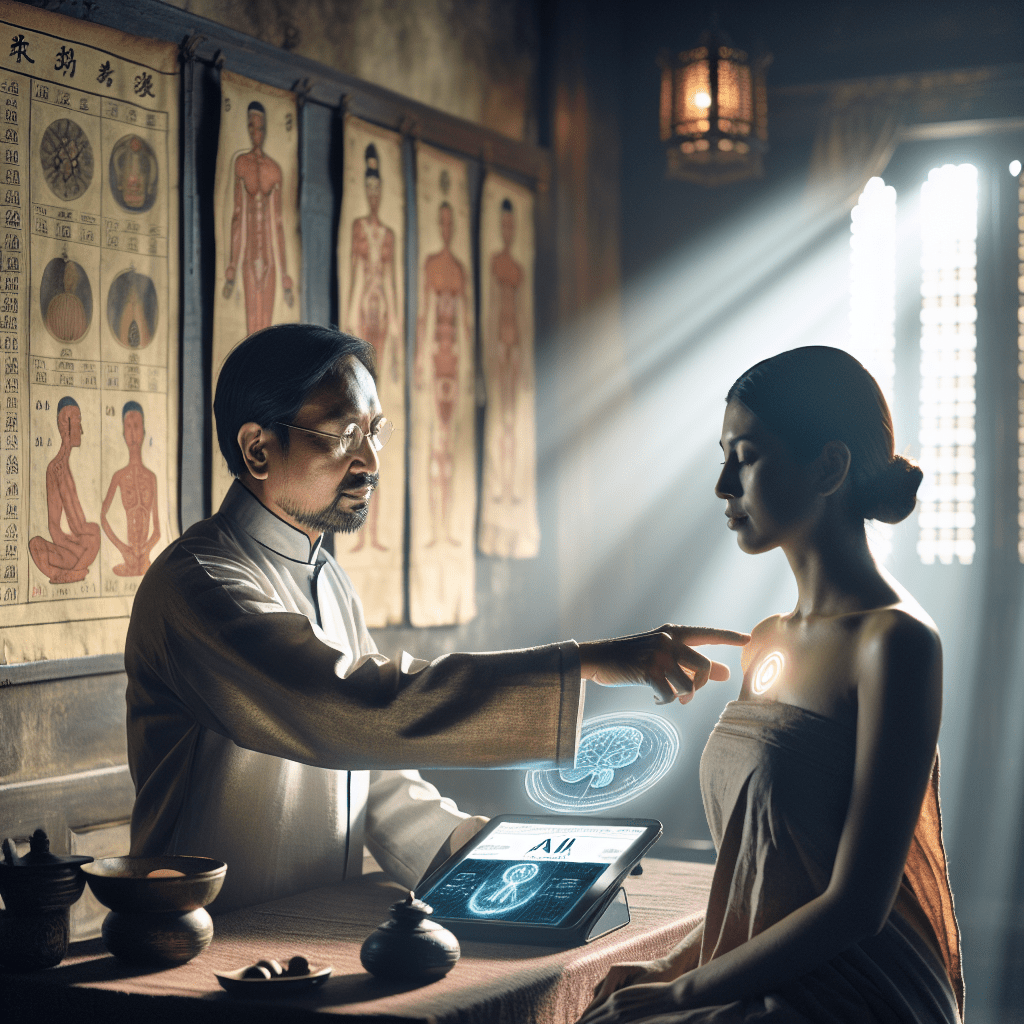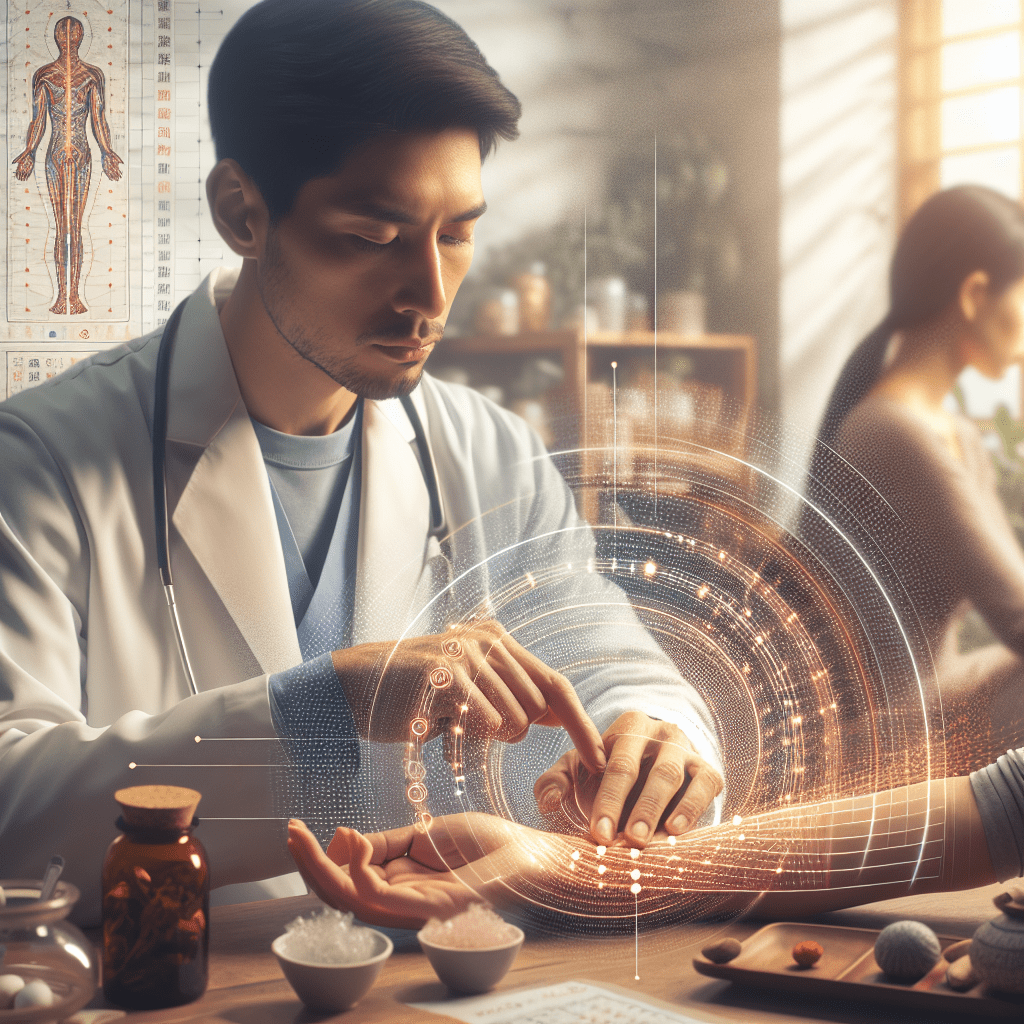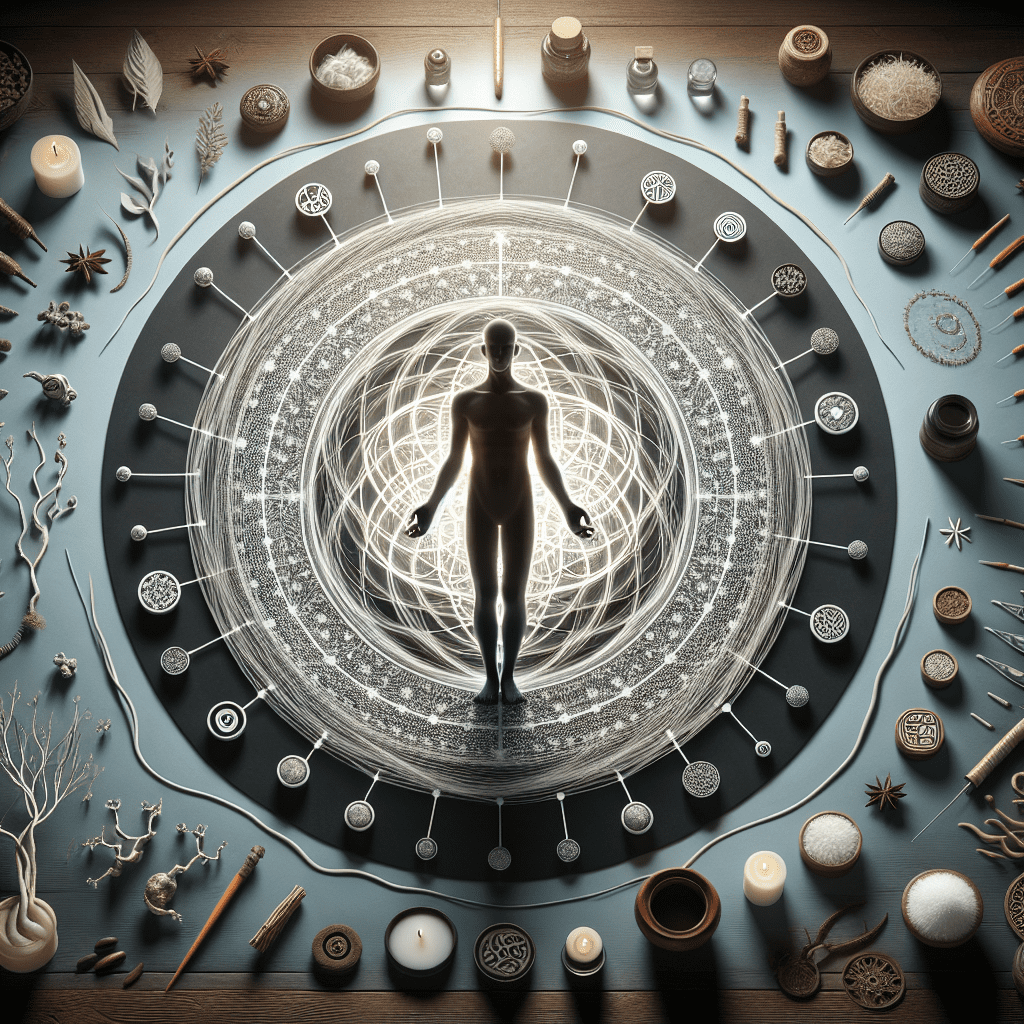In a world where cutting-edge technology shapes nearly every aspect of our lives, an intriguing convergence is taking place between one of humanity’s oldest healing systems and its newest innovations. The integration of artificial intelligence with Traditional Chinese Medicine (TCM) represents a fascinating blend of ancient wisdom and modern technological prowess that’s revolutionizing how we approach wellness and healing.
This innovative fusion isn’t just a scientific curiosity—it’s opening new doors for personalized health journeys that honor time-tested natural approaches while leveraging the precision and efficiency of AI. Imagine having access to healing practices refined over thousands of years, now enhanced by technology that can tailor these approaches specifically to your unique constitution and needs. This is the promise of AI in Traditional Chinese Medicine.
For those of us seeking holistic, natural approaches to wellness, this marriage of Eastern healing philosophies with Western technological advancement offers the best of both worlds. It maintains the core principles that have made TCM effective for millennia—balance, harmony, and treating the whole person rather than just symptoms—while addressing some of its traditional limitations through digital innovation.
Enhancing Quality Control for Reliable Remedies
One of the most significant contributions AI makes to Traditional Chinese Medicine is in the realm of quality control. If you’ve ever tried herbal remedies, you might have wondered about consistency between different batches or products. This is where AI is making a tremendous difference.
Advanced computer vision systems can now analyze herbal materials with remarkable precision, identifying species, detecting contaminants, and ensuring that what goes into your TCM formulations is exactly what should be there. Machine learning algorithms evaluate subtle characteristics of herbs that might be invisible to the human eye, ensuring that each preparation delivers consistent therapeutic effects.
For example, researchers are utilizing AI to analyze the chemical profiles of herbs like ginseng, ensuring that only specimens with optimal medicinal compounds make it into formulations. This means when you choose a TCM remedy enhanced by AI quality control, you’re getting a product that’s been vetted with unprecedented thoroughness.
A recent study showed that AI-driven quality assessment could identify the geographical origin of certain medicinal herbs with over 95% accuracy—something that traditionally required extensive expert knowledge and experience. This level of precision helps preserve the tradition of regional herb selection that’s fundamental to TCM practice while making it more reliable for modern consumers.
Uncovering New Therapeutic Potential
AI in Traditional Chinese Medicine is doing more than just improving existing practices—it’s helping uncover entirely new therapeutic possibilities hidden within ancient remedies. By analyzing vast databases of traditional formulations and their recorded effects, AI systems can identify patterns and relationships that might take human researchers decades to discover.
These systems examine the complex interactions between hundreds of herbs and thousands of bioactive compounds, identifying potential synergies that align with TCM’s holistic approach. Rather than isolating single compounds (as Western medicine often does), AI preserves TCM’s emphasis on harmonious combinations while bringing scientific precision to these formulations.
“We’re seeing AI identify potential therapeutic targets in TCM herbs that we never knew existed,” explains Dr. Lin Chen, a researcher specializing in computational TCM analysis. “In one case, our algorithms identified a combination of three herbs that showed promising effects for inflammatory conditions that hadn’t been documented in traditional texts.”
This exploration of new therapeutic targets means more effective treatments tailored to individual needs—perfectly aligning with the holistic approach sought by health-conscious individuals who value natural wellness solutions.
Revolutionizing Diagnostics with Machine Learning
Traditional Chinese Medicine diagnostics have always been highly sophisticated, involving pulse reading, tongue examination, and detailed questioning about symptoms and lifestyle. Chinese herbal medicine prescriptions rely on these precise diagnostic methods. However, these methods rely heavily on the practitioner’s experience and subjective judgment. Machine learning algorithms are now enhancing this process with objective data analysis.
AI systems trained on thousands of tongue images can now identify subtle patterns and colorations that correspond to different internal imbalances. Similarly, machine learning programs analyze pulse waveforms captured by digital sensors, detecting nuances that might escape even experienced practitioners.
One groundbreaking application uses computer vision to analyze facial features and complexion, correlating these with various TCM constitutional types. By integrating these multiple diagnostic inputs, AI can provide comprehensive assessments that help practitioners develop more accurate treatment recommendations based on unique patient profiles.
A recent clinical study demonstrated that an AI diagnostic system achieved 89% agreement with experienced TCM doctors—and in cases of disagreement, further investigation often revealed valuable insights missed in initial human assessments. This doesn’t replace the human touch in TCM practice but enhances it with complementary technological precision.
Accelerating Chemical Analysis and Drug Discovery
The rich pharmacopeia of Traditional Chinese Medicine contains thousands of herbs with complex chemical profiles. Analyzing these compounds and understanding their effects has traditionally been a painstaking process, but AI is dramatically accelerating this work.
Advanced machine learning models can now predict how certain herbal compounds might interact with human biology, speeding up the identification of active components and their potential therapeutic applications. This means the development of new TCM-based treatments can happen much more efficiently.
AI algorithms analyze massive datasets of molecular structures, biological pathways, and clinical outcomes to identify promising candidates for further research. This computational approach has already led to several breakthroughs, including the identification of novel compounds in common TCM herbs that show potential for addressing modern health challenges.
“What’s particularly exciting is how AI preserves the holistic approach of TCM while bringing scientific rigor to pharmacological research,” notes Dr. Sarah Wong, a specialist in integrative medicine. “Rather than reducing herbs to single active ingredients, these systems can model complex interactions between multiple compounds—precisely how TCM has always approached healing.”
Creating Truly Personalized Treatment Plans
Perhaps the most significant promise of AI in Traditional Chinese Medicine is its ability to create genuinely personalized treatment plans. TCM has always emphasized individualized care based on a person’s unique constitution, but AI takes this principle to new heights.
By analyzing thousands of patient cases and their outcomes, AI systems can identify which approaches are most likely to benefit someone with your specific profile. These recommendations consider not just physical symptoms but also constitutional type, lifestyle factors, and environmental influences—all central aspects of Eastern healing philosophies.
For instance, EASTCHI AI examines constitutional types through Five Element Theory, providing seasonal dietary guidance and embracing the Eastern concept of food as medicine. This system leverages the power of machine learning to deliver customized nutrition plans and lifestyle recommendations grounded in time-tested Eastern medical theories.
A user might receive suggestions for specific herbal formulations, dietary adjustments, acupressure points, and lifestyle modifications—all tailored to their unique situation and updated as their condition evolves. This dynamic, responsive approach embodies the Eastern philosophy of maintaining balance through adaptability.
Real-World Applications Transforming Traditional Practices
The integration of AI in Traditional Chinese Medicine isn’t just theoretical—it’s already transforming practices in numerous concrete ways. In herbal screening, AI systems rapidly evaluate thousands of potential formulations to identify those most likely to address specific health concerns, dramatically accelerating the development of effective remedies.
In new drug development, computational models predict how traditional formulations might be modified for enhanced efficacy while maintaining their holistic approach. This has led to several promising treatments currently undergoing clinical trials, potentially bringing TCM-inspired solutions to a broader population.
AI is also helping refine diagnostic principles by identifying correlations between traditional observations and modern biomarkers. For example, certain tongue characteristics traditionally associated with digestive imbalances have been linked to specific gut microbiome patterns through AI analysis, building bridges between Eastern and Western understanding of the body.
One fascinating application involves using natural language processing to analyze thousands of classical TCM texts, extracting patterns and insights that might otherwise be overlooked. This preservation and enhancement of traditional knowledge ensures that ancient wisdom isn’t lost but rather enhanced and made more accessible.
Promoting Sustainable Use of Traditional Resources
As interest in Traditional Chinese Medicine grows globally, concerns about sustainability have increased. Many medicinal herbs are wild-harvested, and some species face pressure from growing demand. AI is playing a crucial role in addressing these challenges and ensuring responsible resource management.
Machine learning models help optimize cultivation practices for medicinal plants, identifying ideal growing conditions that maximize the production of beneficial compounds while minimizing environmental impact, as detailed in research on AI empowering traditional Chinese medicine. AI systems also assist in authenticating herbs, reducing the harvest pressure on wild populations by ensuring that only genuine materials enter the supply chain.
Additionally, computational approaches are helping develop sustainable alternatives to endangered species traditionally used in TCM. By analyzing the chemical profiles and therapeutic properties of rare herbs, AI can identify more abundant plants with similar medicinal qualities, preserving traditional approaches while protecting biodiversity.
“The integration of AI with TCM isn’t just about technological advancement—it’s also about preservation,” explains environmental botanist Dr. Michael Zhang. “By making production more efficient and identifying sustainable alternatives, we’re ensuring these healing traditions can continue for future generations.”
The Harmonious Future of Wellness
As we look toward the future, the integration of AI in Traditional Chinese Medicine represents a harmonious convergence of ancient wisdom and modern technology. This isn’t about replacing traditional approaches with cold algorithms but enhancing time-tested methods with complementary innovations that make them more effective, accessible, and personalized.
For health-conscious individuals seeking natural wellness options, this technological evolution offers exciting possibilities. The systems theory-driven framework for AI integration into TCM ensures these advancements remain true to traditional principles. It maintains the holistic, balanced approach that draws many to Eastern healing philosophies while addressing practical challenges of consistency, accessibility, and evidence that sometimes create barriers to wider adoption.
The journey toward optimal wellness has always been deeply personal. Now, with AI-enhanced Traditional Chinese Medicine, that journey can be guided by both the accumulated wisdom of thousands of years and the precise, data-driven insights of cutting-edge technology. This powerful combination promises not just better health outcomes but a deeper understanding of the complex, interconnected systems that comprise human wellness.
As platforms like EASTCHI AI demonstrate, the future of healthcare isn’t about choosing between traditional wisdom and modern innovation—it’s about thoughtfully integrating both to create something greater than the sum of its parts. This approach embodies the integrative medicine approach that’s transforming healthcare. In this harmonious blend of East and West, ancient and modern, natural and technological, we find a promising path forward for holistic wellness in the digital age.




